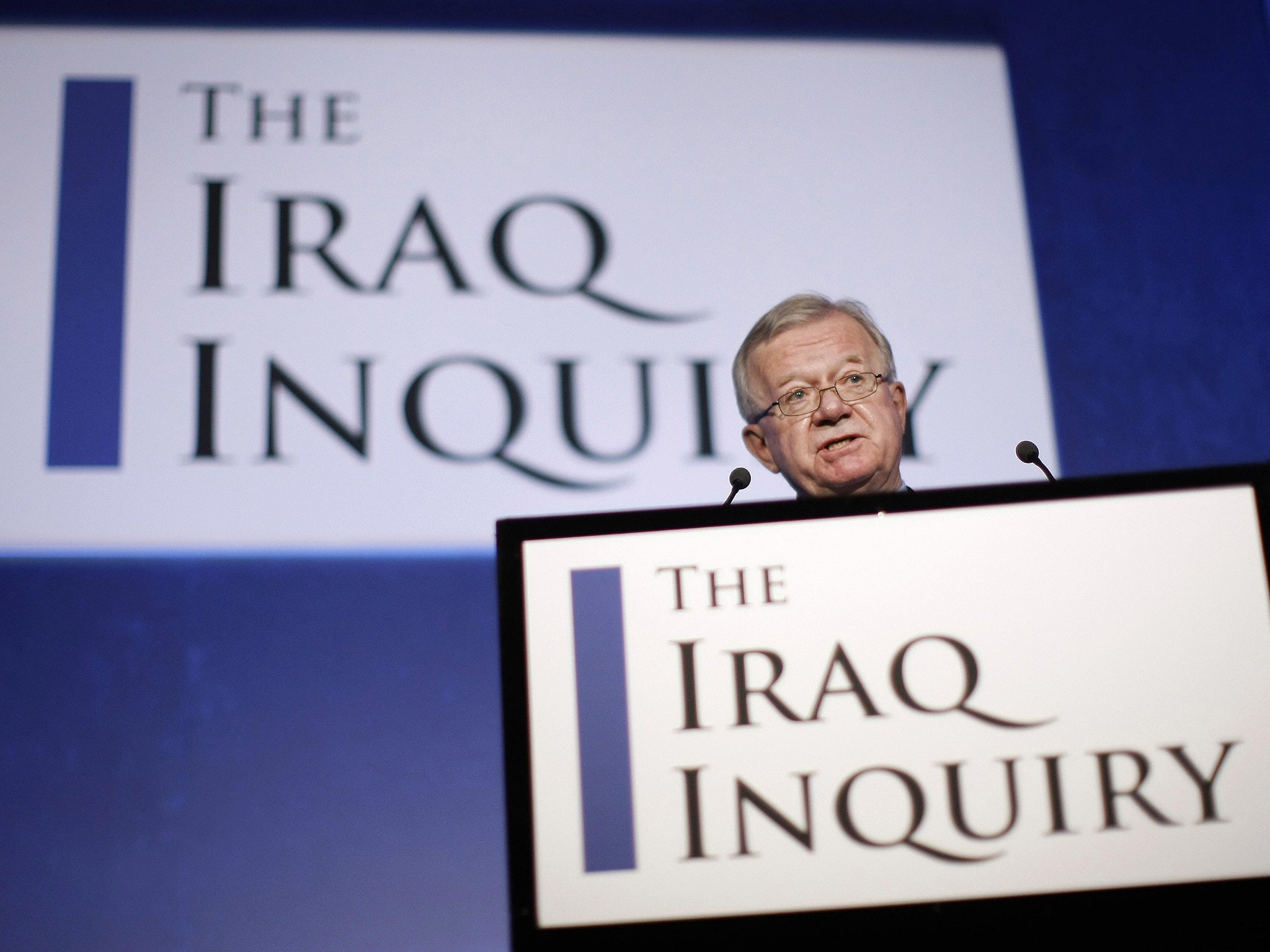The Chilcot report won’t tell us anything new, but there is one lesson we can take from it
Egomaniacs like Blair are an inevitable democratic menace. The question is how to create a system that restricts their scope to do monstrous harm


Chilcot won’t tell us anything we don’t know already, but there is one lesson we can take from it
And now, for John Chilcot, the end is near. Contrary to the natural assumption that he is one of those Greek mythic characters whom the gods curse with a task that defies completion, the old fella will shortly shrug off the Sisyphus of the Civil Service tag.
On 6 July, Sir John will publish his report on the Iraq war at an admirably succinct two million words. For those lacking the patience to endure the last yards of this marathon, or wade it through it line by line (as I intend to do), the Sunday Times has a sneak preview.
Chilcot, “a senior source” tells the paper, will lacerate Mr Tony Blair and others – particularly the endlessly revolting then Foreign Secretary Jack Straw; and Sir Richard Dearlove, the quivering jelly of MI6 – for various failures. The most brutal criticism is apparently reserved not for the manipulation of intelligence to justify the invasion; but for the mismanagement of the occupation which followed.
Given all his hard work, it feels almost too churlish to write this. But hey, Johnny Boy, thanks for everything, and tell us something we don’t know.
We have known since before the invasion of March 2003, as Sir John will reportedly confirm that the previous year in Texas, Blair solemnly pledged to George W Bush that he would follow all and any US plans for Iraq.
We have known for almost as long that the intelligence justified nothing at all. In his 2004 review, Sir Robin Butler said as much. Unfortunately he said it in a Whitehall dialect so opaque that few understood the meaning of “the British Government put a weight on available intelligence that it could not bear”. My Mandarin-English translation software renders this as: “Blair and his gang of sofa-hogging gangsters flamed up gossip into hard fact to pull a fast one on the public.”
And we have known for ages that Blair blithely colluded in the destruction of the existing structures – the Ba’athist middle class and Iraqi army – required to provide the populace with security and such necessities as water, electricity and medicines.
We know that this created not only untold human suffering, but the power vacuum which led to civil war and the emboldening of neighbouring Iran. We know that it also set in motion the transregional domino effect which led to Islamic State, the horrors in Syria and Libya, and much else besides that the world could probably do without.
We know, in other words, that the time long ago came to cease referring to Iraq as “the worst foreign policy mistake since Suez”. We know it for the worst foreign policy mistake in British history.
For all that pre-existing knowledge, you can guess the frantic reaction to the publication of Chilcot. Anyone given a euphemistically savage kicking will parrot whatever legalese their £1,000 an hour lawyers have constructed for them to explain why Chilcot has not said what he has said. The phone-in switchboards will light up like Blackpool’s illuminations with callers demanding Blair’s rendition by Gulfstream to The Hague to await his war crimes trial.
Blair himself will apologise, again, for what he was not responsible for (the poor work of MI6), though not for his grotesque sins of commission and omission. And when the furore has faded, he will continue making millions from giving public relations advice to Asian despots barely more palatable than Saddam.
It is futile railing against a charlatan with a messiah complex, since plausible egomaniacs like Blair (and less plausible ones like Trump) are a perpetual and inevitable democratic menace. The question is how to create a system that restricts their scope to do monstrous harm.
What should dominate the post-Chilcot debate is the question of how to prevent future catastrophes. This is a story not only, perhaps not primarily, about a narcissist craving the global spotlight. It is a story about the absolute failure of the cabinet and independent civil service to act as supposed safeguards against that narcissist’s craziness. In this case, the former allowed itself to be bypassed, as it had since 1997, while the civil service went native for fear of the bullying that had eroded its independence since Blair won that landslide.
And what was learnt from this? Nothing. Absolutely nothing. This much we know because within a decade of the Iraq cataclysm, David Cameron was at liberty to pay homage to Blair, “the Master”, by unleashing his own slice of hell on Libya.
If the end for Chilcot is near, Blair’s true end came so long ago that he now resembles the shell of Winston Smith sipping gin in the Chestnut Tree Cafe in Nineteen Eighty-Four after being released from the Ministry of Love.
Blair stated the case for war, of which he was certain. He did it his way. If this report is the metaphorical final curtain, so what? In reputational terms, he is already the living dead.
But what of a system of government with such pitiful inbuilt checks and balances against prime ministerial folly that Iraq, and eight years later Libya, were possible? For that, in a country with a genius for learning nothing, the end may never be in sight.
Join our commenting forum
Join thought-provoking conversations, follow other Independent readers and see their replies
Comments
Bookmark popover
Removed from bookmarks